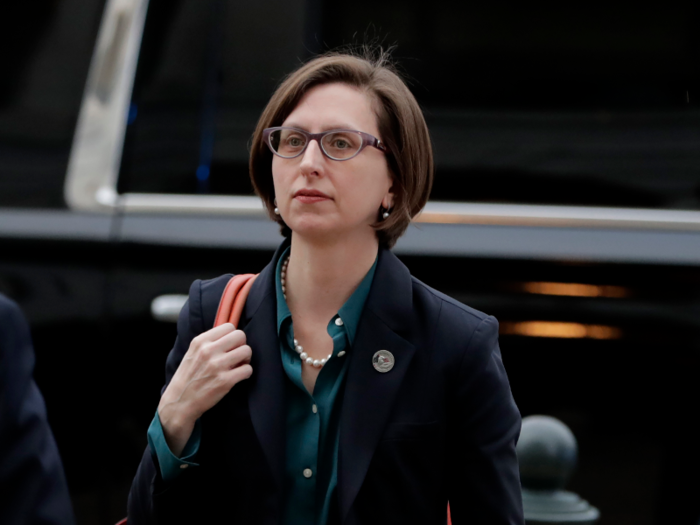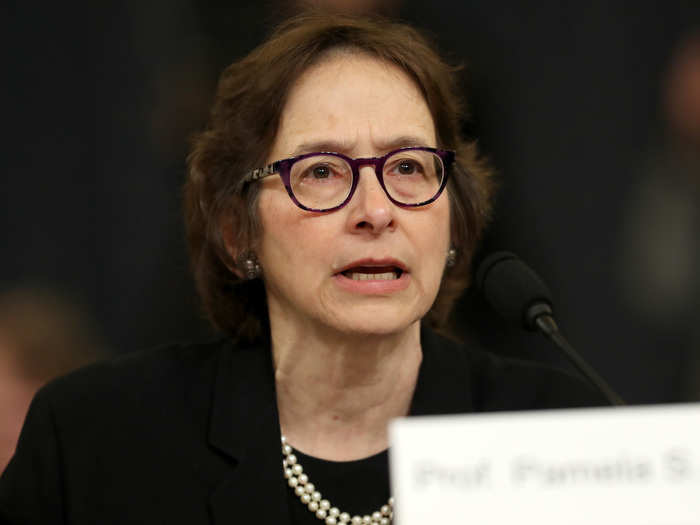- Home
- slideshows
- miscellaneous
- 4 women have emerged as the standout witnesses in impeachment inquiry into Trump
4 women have emerged as the standout witnesses in impeachment inquiry into Trump
Marie Yovanovitch

Fiona Hill

Fiona Hill, who served as Trump's top Russia expert on the National Security Council, earned widespread praise for her commanding, nonpartisan presence as she testified to the House Intelligence Committee in November.
Throughout her public testimony, Hill did not take sides. She disagreed with both Democrats and Republicans at various points.
But she was unequivocal on the subject of election interference and forcefully rebuked GOP lawmakers who pushed a bogus conspiracy theory that Ukraine — not Russia — interfered in the 2016 US presidential election. Hill emphasized that this is Russian propaganda, and that perpetuating it bolsters the Kremlin's efforts to contaminate US politics and divide Americans.
One of the investigations Trump wanted Zelensky to publicly announce was on the conspiracy theory that Hill passionately refuted.
Hill said: "Based on questions and statements I have heard, some of you on this committee appear to believe that Russia and its security services did not conduct a campaign against our country — and that perhaps, somehow, for some reason, Ukraine did. This is a fictional narrative that has been perpetrated and propagated by the Russian security services themselves."
She added: "The unfortunate truth is that Russia was the foreign power that systematically attacked our democratic institutions in 2016. This is the public conclusion of our intelligence agencies, confirmed in bipartisan Congressional reports. It is beyond dispute, even if some of the underlying details must remain classified."
The former NSC official, who also served as national intelligence officer for Russia and Eurasia at the National Intelligence Council from 2006 to 2009, implored the lawmakers involved in the impeachment inquiry to "not promote politically driven falsehoods that so clearly advance Russian interests."
Later on, Hill made a passionate appeal for unity in the US for the sake of its democratic health: "We need to be together again in 2020 so the American people can make a choice about the future and ... make their vote in a presidential election without any fear that this is being interfered in ... from any quarter whatsoever.
Hill, who was born in the UK and became a US citizen in 2002, also celebrated America's immigrant tradition in her testimony by highlighting her own story.
"I can say with confidence that this country has offered for me opportunities I never would have had in England," she said. "I grew up poor, with a very distinctive working-class accent. In England in the nineteen-eighties and nineteen-nineties, this would have impeded my professional advancement. This background has never set me back in America."
This came after another impeachment witness, Lt. Col. Alexander Vindman, was accused of dual loyalty to Ukraine. Vindman came to the US when he was a child as a refugee from Ukraine when it was still part of the Soviet Union.
Hill said the attacks on Vindman were "very unfortunate" and described immigration as the "essence of America."
She went on to say that, with a few exceptions: "Everyone immigrated to the United States at some time in their family history. And this is what, for me, really does make America great."
The Russia expert also earned widespread praise over her insightful reflections on the ways in which women's anger is often ignored or downplayed due to the persistence of sexist attitudes.
This came as Hill testified about confronting Gordon Sondland, Trump's hand-picked US ambassador to the EU, about his circumventing interagency processes for conducting diplomacy with Ukraine, which is not in EU. Hill is among the top experts in the country on Russia and Eastern Europe, and was concerned that the NSC was being left in the dark.
"I was actually, to be honest, angry with him," Hill said of the moment she confronted Sondland, who's also served as a witness in the inquiry.
She added: "And I hate to say it, but often when women show anger it's not fully appreciated — it's often pushed onto emotional issues, perhaps, or deflected onto other people."
Hill also testified that she believed the smear campaign against Yovanovitch was also motivated, in part, by sexist attitudes.
Laura Cooper

Laura Cooper, the deputy assistant secretary of defense for Russia, Ukraine and Eurasia, in her testimony to House impeachment investigators offered one the biggest revelations of any of the hearings: Ukrainian officials asked about a freeze on US military aid the same day as Trump's July 25 phone call with Zelensky.
This strikes at the heart of one of the central questions of the impeachment inquiry: Did Trump condition roughly $400 million in congressionally-approved military aid on Zelensky publicly announcing the launch of investigations into his political rivals?
Trump and his allies have repeatedly claimed there was no quid pro quo, or attempt to bribe or extort Ukraine, linking the aid to the investigations. They've said that Ukraine did not know about the freeze on the aid at the time of the July 25 call, meaning there could be no quid pro quo.
The career Pentagon official told lawmakers that her staff had recently informed her of unclassified emails they'd received from the State Department on July 25 — the same day of the Trump-Zelensky call — that indicated Ukraine was aware of the hold on the military aid.
One of the emails said the Ukrainian embassy in Washington and the House Foreign Affairs Committee were "asking about security assistance." A second email said, "The Hill knows about the FMF (foreign military financing) situation to an extent and so does the Ukrainian embassy."
Cooper also said: "On July 25th a member of my staff got a question from a Ukraine embassy contact asking what was going on with Ukraine security assistance."
Pamela Karlan

Pamela Karlan, a Stanford law professor, stole the show in the House Judiciary Committee's first public impeachment hearing as she made an impassioned, historically-grounded case for why she feels Trump should be impeached.
Karlan excoriated Trump over his pressure campaign on Ukraine. She said Trump "invited" and "demanded" foreign involvement in the 2020 election and "struck at the very heart of what makes this a republic to which we pledge allegiance."
"Based on the evidentiary record, what has happened in the case before you is something that I do not think we have ever seen before: a president who has doubled down on violating his oath to 'faithfully execute' the laws and to 'protect and defend the Constitution,'" she said.
"The list of impeachable offenses the framers included in the Constitution shows that the essence of an impeachable offense is a president's decision to sacrifice the national interest for his own private ends," Karlan added.
At another point, Karlan employed an analogy about a hypothetical disaster in Texas or Louisiana to explain why she concludes that Trump should be impeached.
She asked what people would think if a president withheld congressionally-approved aid from a state facing a disaster in exchange for its governor branding his political opponent a criminal.
"Imagine living in a part of Louisiana or Texas that's prone to devastating hurricanes and flooding. What would you think if you lived there and your governor asked for a meeting with the president to discuss getting disaster aid that Congress has provided for? What would you think if that president said, 'I would like you to do us a favor? I'll meet with you, and send the disaster relief, once you brand my opponent a criminal.'
"Wouldn't you know in your gut that such a president has abused his office? That he'd betrayed the national interest, and that he was trying to corrupt the electoral process? I believe the evidentiary record shows wrongful acts on those scale here."
Karlan was also criticized by Republicans for referencing Trump's son, Barron, while making a point about the extent of presidential authority.
"The Constitution says there can be no titles of nobility, so while the President can name his son Barron, he can't make him a baron," Karlan said, leading Trump's 2020 campaign and first lady Melania Trump to issue scathing statements.
Karlan later apologized.
She said: "I want to apologize for what I said earlier about the President's son, it was wrong of me to do that. I wish the President would apologize, obviously, for the things he's done that's wrong, but I do regret having said that."
- Read more:
- Think Trump will get impeached? Gambling sites say the odds are in your favor
- Trump could be impeached and removed from office but still win reelection in 2020
- Over half of the House of Representatives support the impeachment inquiry against Trump — see all of them here
- Everything you need to know about Trump's impeachment process: What's happened, who the players are, and what comes next
Popular Right Now
Popular Keywords
Advertisement